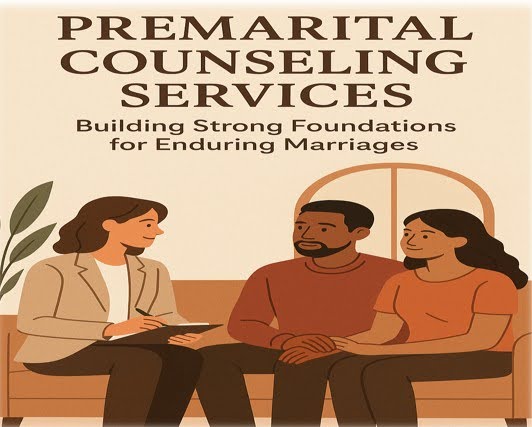Premarital counseling services have become increasingly vital for couples preparing for marriage, offering structured support to enhance communication, address potential challenges, and strengthen emotional bonds. By providing a proactive platform to discuss expectations and resolve conflicts before entering marriage, these services help couples establish a resilient foundation for long-term partnership success.
Definition
Premarital counseling is a guided therapeutic process conducted by professionals such as Licensed Marriage and Family Therapists (LMFTs) or, in some cases, religious leaders. These sessions offer couples the opportunity to explore key areas of potential conflict, including finances, intimacy, and parenting responsibilities, while developing essential skills in communication and conflict resolution. The process also allows partners to reflect on their values, beliefs, and long-term goals in a safe and supportive setting. Evidence shows that such proactive engagement not only reduces the risk of divorce but also fosters higher levels of marital satisfaction and relationship stability.
Key Growth Drivers
Multiple societal and lifestyle factors are propelling the demand for premarital counseling. Growing awareness about the importance of early relationship interventions has led many couples to seek structured counseling before marriage. This shift is further supported by the broader acceptance of mental health and therapy services across communities. At the same time, modern lifestyles characterized by career pressures, financial stress, and complex personal expectations have intensified the need for external guidance. Additionally, cultural changes have encouraged couples to openly discuss challenges and seek professional support, making counseling a more mainstream part of wedding preparation.
Emerging Trends
The premarital counseling market in 2025 is evolving rapidly with several transformative trends. The rise of online and virtual counseling platforms has greatly improved accessibility, enabling couples to receive guidance regardless of location. Programs are increasingly being customized to address the needs of diverse couples, including intercultural marriages and LGBTQ+ partnerships. Moreover, advanced therapeutic techniques such as emotion-focused therapy and cognitive-behavioral therapy are being integrated into counseling practices, enriching the quality of intervention. Alongside traditional sessions, workshops, and retreats are gaining popularity as complementary services, while digital tools such as mobile applications are providing couples with ongoing relationship exercises and communication support long after the sessions end.
Future Outlook
The outlook for premarital counseling services is highly promising, with emotional well-being taking center stage in relationship planning. More couples are considering counseling as an essential part of wedding preparation, creating opportunities for providers to expand both reach and sophistication. The sector is expected to witness significant innovation, with artificial intelligence being integrated into counseling tools to offer real-time, adaptive support. Data-driven therapy models that personalize sessions based on couple dynamics and feedback are also anticipated to play a key role in shaping the future, ensuring interventions remain relevant and highly effective.
Strategic Moves and Market Insights
In August 2025, Inner Space launched an online premarital counseling platform offering both joint and individual sessions, with a focus on improving communication, intimacy, and conflict resolution.
In March 2025, the National Commission for Women (NCW) launched 21 pre-marital counseling centers across nine states, including Maharashtra, Madhya Pradesh, Kerala, Delhi, Gujarat, Haryana, Rajasthan, and Odisha. These centers, part of the ‘Tere Mere Sapne’ program, offer guidance on social, psychological, and behavioral aspects of marriage to promote healthy relationships.
In September 2024, the Kerala Women’s Commission proposed making premarital counseling mandatory at the local self-government level before couples register for marriage. This initiative aims to address rising divorce rates and strengthen family units.
In August 2024, China’s Civil Affairs University introduced the nation’s first undergraduate program in Marriage Services and Management. The program aims to train professionals in family counseling, wedding planning, and matchmaking product development to address the declining marriage and birth rates.
Between 2024 and 2025, several counseling service providers expanded their virtual offerings to meet rising demand for convenience and privacy. Increasing collaborations with religious and community organizations are also embedding counseling into traditional marriage preparation frameworks, ensuring broader reach and acceptance. Furthermore, the integration of mental health and holistic well-being practices into counseling curricula reflects the larger societal trend toward comprehensive care, solidifying premarital counseling as an essential investment in lifelong relationship health.
Conclusion
Premarital counseling services are increasingly recognized as a critical step in building lasting marriages. By equipping couples with the tools to communicate effectively, resolve conflicts, and align their long-term goals, these services serve as a strategic investment in lifelong relationship success. As the market continues to evolve with new technologies, diverse program offerings, and greater accessibility, premarital counseling is set to play a transformative role in strengthening marital foundations in the years ahead.
About Author:
HTF Market Intelligence Consulting is uniquely positioned to empower and inspire with research and consulting services to empower businesses with growth strategies, by offering services with extraordinary depth and breadth of thought leadership, research, tools, events, and experience that assist in decision-making.


